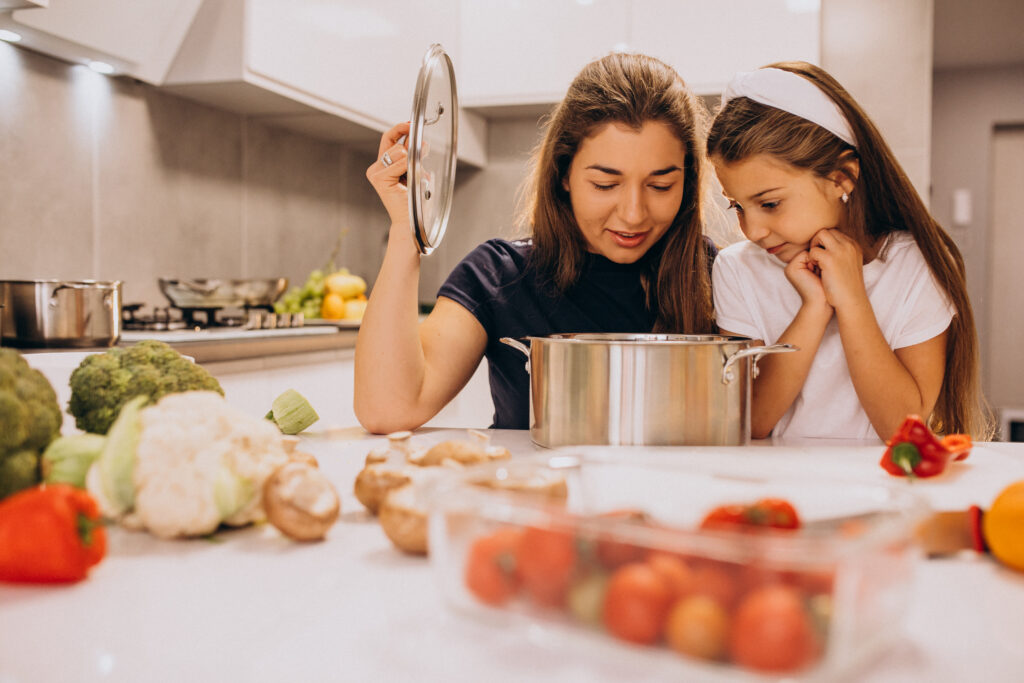
I used to love home ec class in junior high. It was a required class for everyone, and cooking and basic sewing were the topics. I already knew how to sew on buttons and had a few cooking skills too. But sewing my own apron to wear while we learned to cook—that was a nice full-circle moment for 13-year-old me. These days home economics classes are scarce in public schools, which is unfortunate. As a parent, the responsibility of passing along essential life skills, like how to cook a few basic dishes, is probably all on you. Here are my tips for teaching your kids kitchen skills in a fun and age-appropriate way—from preschool to high school.
Practice Often
Making and decorating holiday cookies is great fun, but I recommend including your “little helper” in kitchen activities every week. Feeding oneself daily is a lifelong prospect, after all. So we may as well demonstrate how a little planning and prep can be helpful on a regular basis. And you can still make it fun and creative! Consider having your child help you on the weekend, when you may have more time to supervise. The idea is to teach and also inspire—it’s hard to do that on hectic weeknights when everyone’s waiting for dinner.
Provide “Kid-Sized” Tools for Little Ones
Get a small apron and a few “beginner” cooking tools, like plastic knives or their own set of measuring spoons. They’ll help kids feel important in the process and make everything more fun for them. (Here’s a good synopsis of what to consider when looking for appropriate kitchen tools for different ages and skills). And don’t forget a step stool so your child can work alongside you and reach the counter and sink.
Teach Age-Appropriate Kitchen Skills
From preschool age on, there’s a kitchen job for everyone! And when the whole family participates or demonstrates teamwork in the kitchen, it becomes natural for younger children to pitch in.
Start with basic food safety skills like hand-washing and wiping down the food-prep area. These tasks always need to be done and are good habits to instill. From there, dexterity and motor skills will develop, along with confidence and experience in the kitchen. Based on their capabilities, you can decide what kitchen tasks your child can accomplish. Here’s a good guide for what’s appropriate at different ages. And let your kids make choices about what to pack for school lunches. It’s a helpful way to involve them in prepping their own food—check out our tips for this here.
Teach Food Shopping Skills Too
When you can, take kids along when shopping for food, whether it’s at a farmer’s market or the supermarket. Show them and discuss messages about nutrition, where different foods come from, and how to read labels and compare package prices and sizes. This is all important information for learning how to make wise diet-related financial and health decisions. Younger children are usually happy to go along to the store, especially if they have little jobs to help you while shopping. Show them how to find foods that have Guiding Stars. And get them involved in making some of the food choice decisions. (Check out my post about shopping with kids for specific ideas and tips.)
Be Open to Ideas From Your Kids
As children become pre-teens and teens, they’ll likely be exposed to videos, cooking shows, and other outside sources of recipes and nutrition information. And they may come home with their own ideas of what to try in the kitchen. That’s something to encourage, and hey, maybe you’ll learn something new in the process, too! (Do check for food safety concerns with “hacks” and ideas from viral videos.) When they come to you with ideas, listen. Maybe you don’t have the time to help make exactly what your teen has in mind. But is there something similar you can make, or can you plan to do it another day? These conversations are also a good time to teach other important skills—planning balanced meals, checking ingredients on hand, and shopping within a budget. (Sorry, we can’t make filet mignon on a random Tuesday night!)
Consider the Life Lessons That Cooking Can Teach
As children progress in their skills and confidence, they’ll still need you for help, supervision, and encouragement at times. I remember trying to master making fudge on the stove when I was a kid. The ingredients were kind of pricey, but my mom let me try batch after batch until we ran out. I’ll never forget that she didn’t get mad at me and instead just encouraged me to try again. (Read my fudge story here). Learning tenacity in the kitchen wasn’t what I expected that day, but it was a memorable lesson.